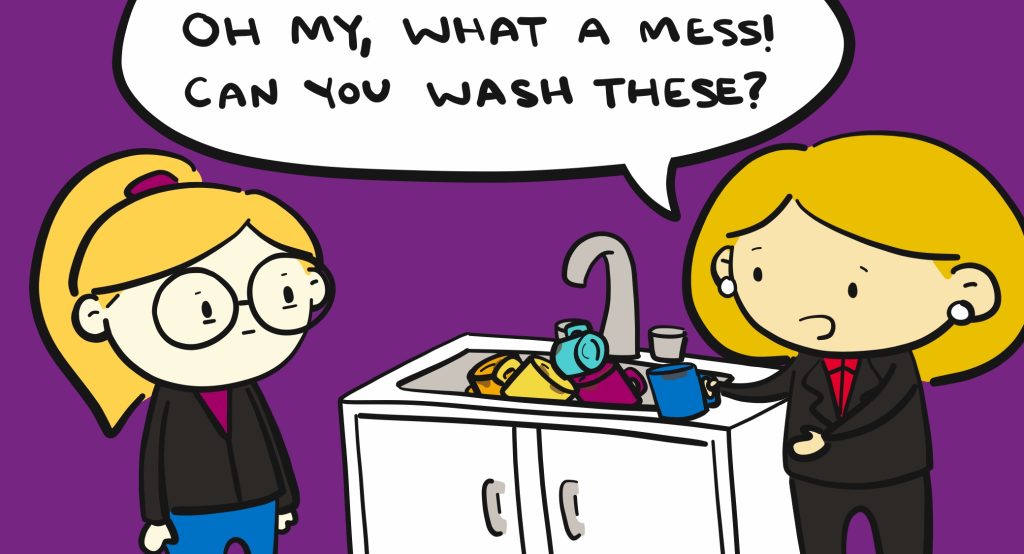It is a familiar line that lurks at the bottom of almost all job postings: “And other duties as assigned.”
In most cases, the vague phrase encompasses tasks that arise infrequently and out of necessity. Such as, when a team member is on vacation, and you are asked to take on some of their responsibilities until they return. Most of the time, these “other duties” are a natural part of working in an office and on a team.
However, sometimes these additional tasks are completely unrelated to your job description and require little to no specific skills or knowledge, such as running a personal errand for your boss or washing your coworkers’ coffee mugs. These demands put you in a position where agreeing to the task undermines your responsibility and sets a precedent that could devalue your worth.
Responding to these unreasonable requests from a boss or coworker requires being direct and non-defensive, while still committed to the success of the team. Below are five tips for refusing these tasks in a polite and professional manner.
-
Take a deep breath and evaluate the situation
Before saying no, take a deep breath or step outside for fresh air. While you may be understandably frustrated or caught off guard by a request like picking up your boss’s dog from doggy daycare or cleaning out the office refrigerator, you do not want to respond defensively — or imply that you are “above” or “too good” for the task. However, it is still important to remain direct as you communicate your boundaries between what is considered a professional task and what is a personal errand or shared responsibility of everyone in the office. Taking a few minutes to collect your thoughts will allow you to express a confident and clear refusal that focuses on solutions without becoming argumentative.
-
Say no in person if possible
If the request is sent to you via email, it will likely feel natural to respond that way as well. And if confrontation makes you nervous (as it does for most people!), it might be more comfortable saying no in an email. But we all know that tone, intent and meaning do not always convey electronically the way we we hope it will. Talking face-to-face ensures the explanation for your refusal is delivered and interpreted in the manner you intended.
-
Highlight your current contributions
Many times, requests like a personal errand are made during a stressful project or impending deadline. It is important to acknowledge the current situation, and you might need to remind your boss about your role in the project and how you are already contributing to its completion. Communicate your concern of how this personal task — such as picking up dry cleaning — would take time away from your priorities. Try something like: “I know we are in the middle of a quick deadline and everyone is pulled in a lot of directions. I am currently balancing both the expense report updates and the meeting logistics and being away from the office for this task will result in a delay in these critical areas. I’ll be sure to relay to you any important calls that come in if you need to take some personal time.”
-
Emphasize that you do want to help
Being asked to do something that should be a shared responsibility of the office or is a personal responsibility of a supervisor requires a direct refusal that clearly demonstrates your boundaries. One good way to refuse, is to follow-up the refusal with something you can do to help. The most valued employees are those who solve problems and make the office environment more enjoyable and productive by offering solutions.
For example, if the break room microwave is dirty by the end of the week, suggest creating a shared cleaning schedule with everyone’s name on it and take turns cleaning it every Friday afternoon. If coffee mugs are going unwashed, volunteer to make signs reminding everyone to clean up after themselves.
For example, if a supervisor asks you to go buy snacks for his son’s soccer match because he is bogged down reading reports, you could offer to read the reports and present notes or highlights for him. This does not necessarily mean taking on extra work, but knowing your strengths and where you can best utilize your professional skills to help your team move things along.
-
Have a deeper conversation
If this keeps happening, sit down with your supervisor or coworker to discuss expectations. Use this as an opportunity to ensure everyone is on the same page about your role and job description. If duties or expectations have changed, then you can consider how you want to move forward.
Finding a balance between being a team player while not minimizing your role can be tricky. Ultimately, everything comes down to communication. Approaching the situation with professionalism, clarity and a genuine spirit to contribute can show your supervisor and coworkers that you are committed to the office’s success while also maintaining your worth.



